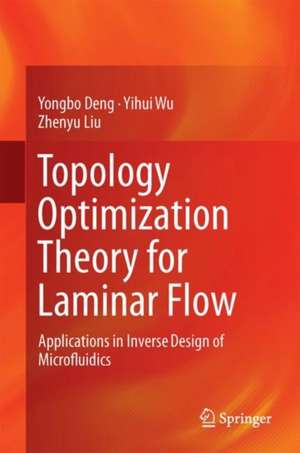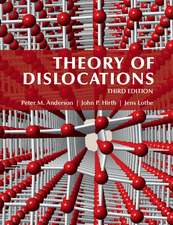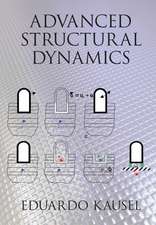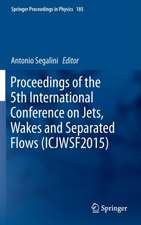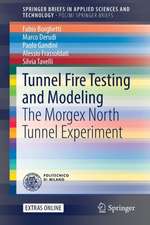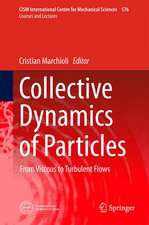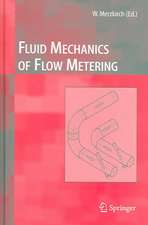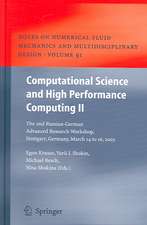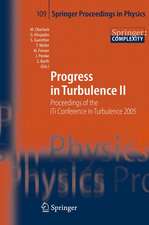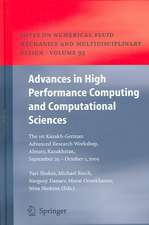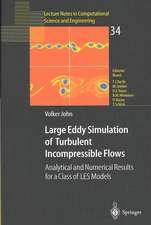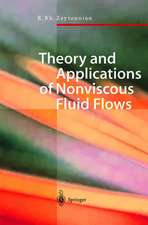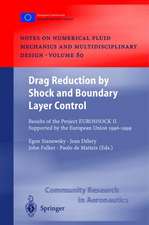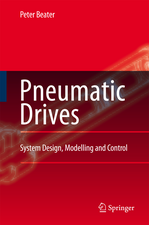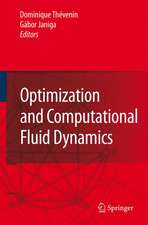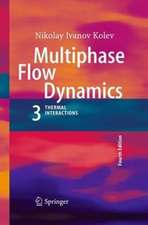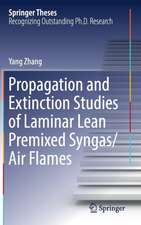Topology Optimization Theory for Laminar Flow: Applications in Inverse Design of Microfluidics
Autor Yongbo Deng, Yihui Wu, Zhenyu Liuen Limba Engleză Hardback – 6 oct 2017
Unsteady, body-force-driven and two-phase properties are basic characteristics of the laminar flows. The book discusses these properties, which are typical of microfluidics and one of the research hotspots in the area of Micro-Electro-Mechanical Systems (MEMS), providing an efficient inverse design approach for microfluidic structures. To demonstrate the applications of this topology optimization theory in the context of microfluidics, it also investigates inverse design for the micromixer, microvalve and micropump, which are key elements in lab-on-chip devices.
| Toate formatele și edițiile | Preț | Express |
|---|---|---|
| Paperback (1) | 942.94 lei 6-8 săpt. | |
| Springer Nature Singapore – 9 feb 2019 | 942.94 lei 6-8 săpt. | |
| Hardback (1) | 948.92 lei 6-8 săpt. | |
| Springer Nature Singapore – 6 oct 2017 | 948.92 lei 6-8 săpt. |
Preț: 948.92 lei
Preț vechi: 1157.22 lei
-18% Nou
Puncte Express: 1423
Preț estimativ în valută:
181.60€ • 189.35$ • 150.92£
181.60€ • 189.35$ • 150.92£
Carte tipărită la comandă
Livrare economică 20 martie-03 aprilie
Preluare comenzi: 021 569.72.76
Specificații
ISBN-13: 9789811046865
ISBN-10: 9811046867
Pagini: 250
Ilustrații: XI, 250 p. 181 illus., 97 illus. in color.
Dimensiuni: 155 x 235 x 21 mm
Greutate: 0.54 kg
Ediția:1st ed. 2018
Editura: Springer Nature Singapore
Colecția Springer
Locul publicării:Singapore, Singapore
ISBN-10: 9811046867
Pagini: 250
Ilustrații: XI, 250 p. 181 illus., 97 illus. in color.
Dimensiuni: 155 x 235 x 21 mm
Greutate: 0.54 kg
Ediția:1st ed. 2018
Editura: Springer Nature Singapore
Colecția Springer
Locul publicării:Singapore, Singapore
Cuprins
Introduction.- Topology optimization for unsteady flows.- Topology optimization for fluid flows with body forces.- Topology optimization for two-phase flows.- Combination of topology optimization and optimal control method.- Inverse design of microfluidics using topology optimization.
Notă biografică
Yongbo Deng received the Ph.D. degree in mechanical engineering from University of Chinese Academy of Sciences, in June of 2012. From July of 2012, he began his Assistant Professor position, in State Key Laboratory of Applied Optics (SKLAO), Changchun Institute of Optics, Fine Mechanics and Physics (CIOMP), Chinese Academy of Sciences. In September of 2014, he derived his Associate Professor position in the same laboratory. During this period, he ever worked in IMTEK, University of Freiburg, for his research collaboration on electromagnetic metamaterial. In May of 2016, he derived the Guest Professor Fellowship from Karlsruhe Institute of Technology (KIT) for his outstanding research on topology optimization-based inverse design methodology. His research interests are topology optimization-based inverse design method with applications in the areas of microfluidics and photonics, and the fabrication processes of MEMS devices.
Area of work:
Simulation and optimiza
tion in hydrodynamics and mechanics Partial differential equation constrained optimization problem and inverse problem, especially topology optimization, shape optimization and optimal control methods, design and manufacture of MEMS devices, especially the microstructure, microfluidics and photonic devices
Finite element method (Galerkin finite element, mixed finite element, multiscale finite element, vector finite element)
Yihui Wu received her PhD degree from Changchun Institute of Optics, Fine Mechanics and Physics (CIOMP), Chinese Academy of Sciences (CAS) in 1996. She has been a professor of CIOMP since 1999 and now she is a distinguished professor of CAS. She is the group leader of Micro/Nano research in CIOMP. Her research interests are high speed flywheel, spectrometer, Lab-on-a-chip and label-free photonic/phononic biosensors and super resolution imaging.
Zhenyu Liu received the Ph.D. degree in mechanical engineering from Dalian University of Technology, Dalian, China, in 2000, and Habilitation and Privatdozent from Department of Microsystems Engineering, University of Freiburg, Freiburg, Germany in 2009. From 2000 to 2009, he was a research assistant and a group leader in the Department of Microsystems Engineering, University of Freiburg, Freiburg, Germany. Since 2009, he has served for Changchun Institute of Optics, Fine Mechanics and Physics (CIOMP), Chinese Academy of Sciences, Changchun, China. His research interests are the simulation and optimization of devices in MEMS.
Simulation and optimiza
tion in hydrodynamics and mechanics Partial differential equation constrained optimization problem and inverse problem, especially topology optimization, shape optimization and optimal control methods, design and manufacture of MEMS devices, especially the microstructure, microfluidics and photonic devices
Finite element method (Galerkin finite element, mixed finite element, multiscale finite element, vector finite element)
Yihui Wu received her PhD degree from Changchun Institute of Optics, Fine Mechanics and Physics (CIOMP), Chinese Academy of Sciences (CAS) in 1996. She has been a professor of CIOMP since 1999 and now she is a distinguished professor of CAS. She is the group leader of Micro/Nano research in CIOMP. Her research interests are high speed flywheel, spectrometer, Lab-on-a-chip and label-free photonic/phononic biosensors and super resolution imaging.
Zhenyu Liu received the Ph.D. degree in mechanical engineering from Dalian University of Technology, Dalian, China, in 2000, and Habilitation and Privatdozent from Department of Microsystems Engineering, University of Freiburg, Freiburg, Germany in 2009. From 2000 to 2009, he was a research assistant and a group leader in the Department of Microsystems Engineering, University of Freiburg, Freiburg, Germany. Since 2009, he has served for Changchun Institute of Optics, Fine Mechanics and Physics (CIOMP), Chinese Academy of Sciences, Changchun, China. His research interests are the simulation and optimization of devices in MEMS.
Textul de pe ultima copertă
This book presents the topology optimization theory for laminar flows with low and moderate Reynolds numbers, based on the density method and level-set method, respectively. The density-method-based theory offers efficient convergence, while the level-set-method-based theory can provide anaccurate mathematical expression of the structural boundary.
Unsteady, body-force-driven and two-phase properties are basic characteristics of the laminar flows. The book discusses these properties, which are typical of microfluidics and one of the research hotspots in the area of Micro-Electro-Mechanical Systems (MEMS), providing an efficient inverse design approach for microfluidic structures. To demonstrate the applications of this topology optimization theory in the context ofmicrofluidics, it also investigates inverse design for the micromixer, microvalve and micropump, which are key elements in lab-on-chip devices.
Unsteady, body-force-driven and two-phase properties are basic characteristics of the laminar flows. The book discusses these properties, which are typical of microfluidics and one of the research hotspots in the area of Micro-Electro-Mechanical Systems (MEMS), providing an efficient inverse design approach for microfluidic structures. To demonstrate the applications of this topology optimization theory in the context ofmicrofluidics, it also investigates inverse design for the micromixer, microvalve and micropump, which are key elements in lab-on-chip devices.
Caracteristici
Provides numerical implementation details to help readers learn and master topology optimization skills Offers several numerical examples in the area of microfluidics Discusses the topology optimization theory for laminar flows mathematically and coherently Presents several microfluidic element layouts Includes supplementary material: sn.pub/extras
